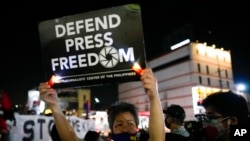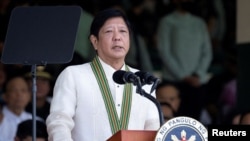Authorities in the Philippines on Friday announced they have identified two suspects in the case of a radio journalist shot dead on May 31.
Cresenciano “Cris” Bundoquin was killed in a drive-by attack in Calapan City in the Philippines Oriental Mindoro province about 4 a.m. May 31.
In a statement on Facebook, Paul Gutierrez, executive director of the Presidential Task Force on Media Security, named the two gunmen as Narciso Ignacio Guntan and Isabelo Lopez Bautista.
Guntan died in a motorcycle crash while fleeing the scene, the statement said. Bautista is still at large. Gutierrez called on Bautista’s family to persuade him to surrender.
Radio journalist Bundoquin hosted the Ayos Mandin radio program on the local broadcaster DWXR 101.7 Kalahi FM and owned the MUX Online Radio broadcaster. Local journalists say the 50-year-old was critical of the government and political issues in his region.
Bundoquin was what is known as a “radio block timer” — a unique media approach where journalists buy up radio airtime in regions and provinces to provide their own coverage. It is often funded by politicians or political groups who aim to promote their narratives.
Philippine journalists say that radio reporters — particularly those who use the block time method — are more at risk, even with efforts by the government to set up task forces to protect media.
President Ferdinand “Bongbong” Marcos Jr. appointed award-winning journalist Gutierrez as the new chief of the media security task force in May as part of those efforts.
The Philippines is widely regarded as among the most dangerous places in the world for journalists.
The National Union of Journalists of the Philippines (NUJP) says journalists face threats such as red-tagging, cyber libel and physical attacks.
Research by the union showed more than 53 press violations since Marcos Jr. took office. During former President Rodrigo Duterte’s six years in charge, the annual average was 41, according to a May 2023 report by the New York-based Committee to Protect Journalists (CPJ).
VOA reached out to the Philippines Presidential Office for comment but have yet to receive a reply.
Bundoquin is the first journalist killed in the Philippines in 2023 — and the fourth to be slain since Marcos Jr. became president in June 2022.
Jonathan de Santos, chair of the NUJP, told VOA that the media work in a risky environment.
“The latest killing, which incidentally happened in the same month as World Press Freedom Day, shows that journalism is still dangerous in the Philippines despite a seemingly better relationship between the national government and the press. Media workers in the regions are generally more at risk, and broadcasters are particularly so, and this incident – if shown to be work related – makes that even more clear,” he added.
In October 2022, another radio journalist was killed on his way home in Las Pinas, Metro Manila.
Percival Mabasa, known as Percy Lapid, was a prominent radio reporter and YouTuber. In November, the Philippines Bureau of Corrections prison chief and a security aide were charged with masterminding the killing of Mabasa, who had been critical of the prison authorities.
Also killed in 2022 were Renato Blanco and Federico Gempesaw.
Raymund Villanueva, a journalist for Kodao Productions and a safety officer at the NUJP, said the use “block timing” puts journalists at risk.
“More than half of media killing victims are block time broadcasters. ... Within a system where low salaries prevail over salaried media workers and radio stations fill up their time slots with block time to do business, it will always be exploited by political interests who have no compunction about killing," Villanueva told VOA.
Being a journalist isn’t easy in the Philippines, but there is hope the media environment may improve.
Duterte had an uneasy relationship with the press, often criticizing journalists publicly. His administration formed a task force on media security in 2016, but local journalists say it has had little success.
Marcos Jr. vowed to ensure press freedom before he was elected.
De Santos hopes the Marcos Jr. administration will do more to protect the media with a new team leading the media security task force.
"We [are hopeful] that the president’s statements about upholding the rights of and ensuring the safety of the press will translate to action on this case and in recent cases of attacks on journalists. Having former journalists at the Presidential Communications Office and the Presidential Task Force on Media Security are also encouraging signals, so we do hope that this case is resolved soon, and the perpetrators brought to justice," he added.
The Philippines ranked seventh on CPJ’s Impunity Index 2022, which focuses on the countries where journalists are killed, and their attackers go free.
And the country ranks 132 out of 180 countries on the World Press Freedom Index, where 1 has the best media environment.





